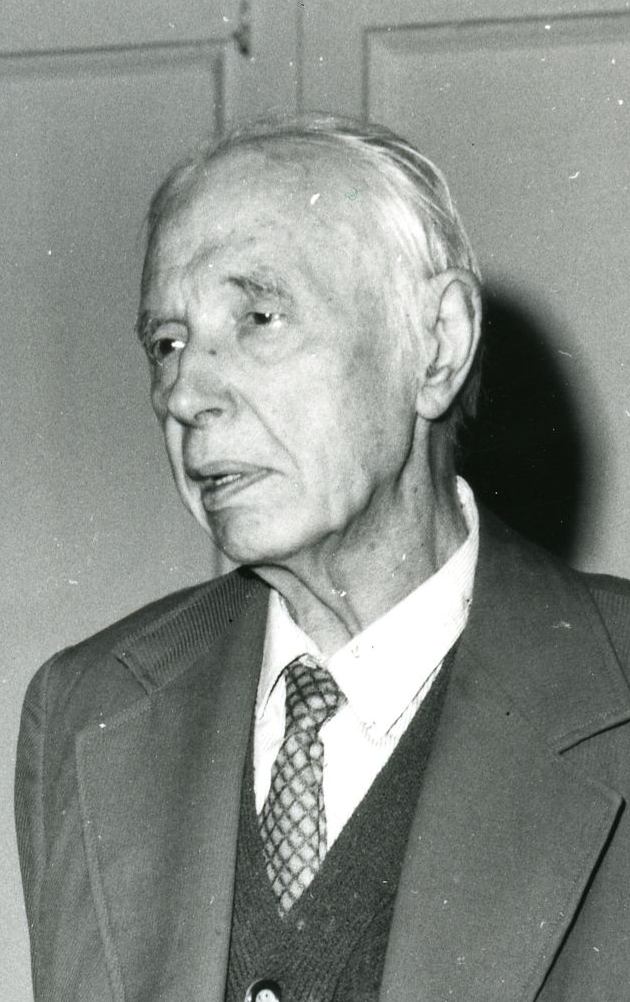
Valmar Adams
Valmar Adams (born as Vladimir Karl Moritz Adams) was a poet, prosaist, literary scholar, and editor. He also wrote under the pseudonyms Vilmar Adams (1924-1933) Vladimir Aleksandrovski and Inno Vask. He was born in St. Petersburg in 1899 but relocated to Tartu in 1909, where he finished high school in 1919. From 1923 – 1929, he studied at the University of Tartu, eventually receiving a Mag.Phil degree in Estonian and general literature from the Faculty of Philosophy. After graduating, he secured a scholarship for advanced studies at Prague University, where he attended from 1929 – 1931.
Adams may be best noted for his involvement with the university and other organizations. He was one of the founding members of the Estonian PEN Club (formed in 1928), a collection of writers and journalists who defended freedom of speech and human rights. From 1926 ‒ 1928, he worked as the head editor of Üliõpilasleht (‘Students’ Newspaper’) and from 1940 ‒ 1941 for the newspaper Tartu Kommunist (‘Tartu Communist’).
Intermittently between 1940 – 1974, Adams worked as a lecturer at TartuStateUniversity, teaching Russian language and literature. This period was speckled with interference from both German occupation during the war as well as Soviet political allegations after it. He was imprisoned both times—first from 1941 – 1944 and later from 1950 – 1955. Afterwards, he resumed his teaching.
Given his interest in Russian literature, it is unsurprising that one of Adams’ primary poetic influences was Russian poetry. He debuted in 1915 with Russian and German poems and as a co-author of the Russian almanac “Via Sacra,” which was printed in Tartu. However, from 1924 onwards, his work—including poems, translations, critiques, and research—appeared in Estonian periodicals and journals. In 1926, he joined the Estonian Writers’ Union, the last member to be born in the nineteenth century. With changes brought about by Soviet Occupation, he later joined the Soviet Estonia Writers’ Union in 1966.
Adams’ first poetry collections Suudlus lumme (‘A Kiss into the Snow’) and Valguse valust (‘Of the Pain of Light’) were published in 1924 and 1926 respectively. Both concentrated on the internal, subjective “I,” focusing on feelings of loneliness and romantic yearnings. His verse structure was multifaceted, as were the innovations of his rhyme. Adams published three more collections of poetry in the 1930s: Maise matka poolel teel (‘Halfway through One’s Earthly Journey’) in 1932, Põlev põõsas (‘The Burning Bush’) in 1937, and Tunnetuse tund (‘An Hour of Perception’) in 1939. These collections maintained Adams’ subjectivity but had a more rational outlook on life and were stricter in form.
After the publication of Tunnetuse tund, a couple decades passed before Adams published his next collection of poetry Nooruse tolmunud kuld (‘The Dusty Gold of Youth’) in 1972. In 1971 he published the diary Sinu sekundid (‘Thy Seconds’), but as with his later works—the literary essay collection Oomega (‘Omega’, 1985) and the genre-bending compilation Õhtune Valgus (‘Evening Twilight’, 1982)—Sinu sekundid consisted of autobiographical thoughts and memoirs that he had written in the past decades and differed in that sense from his earlier publications. In 1987, he published the novel Esta astub ellu (‘Esta Enters upon Life’), which he considered to be a memoir. For this novel, he was awarded the Smuul Literary Award in 1988.
As a literary scholar, Adams primarily researched Russian literature and Russian-Estonian literary relationships, but he also explored the history and problems of Estonian versification. These scholarly investigations were published in part in Vene kirjandus, mu arm (‘Russian Literature, My Love’) in 1977, but some of them have remained as manuscripts. He also actively participated with the compilation and editing of Russian language textbooks.
A film was made about Adams called “Intiimne Adams” (‘Intimate Adams’) in 1986. He died in 1993 in Tartu.
M. M.
Books in Estonian
Poems
Vilmar Adams, Suudlus lumme. Tartu: Sõnavara, 1924, 103 lk.
Vilmar Adams, Valguse valust: 1925. aasta intermezzo. Tartu: Sõnavara, 1926, 110 lk.
Vilmar Adams, Maise matka poolel teel: kolmas kogu luulet. Tartu: Eesti Kirjanikkude Liit, 1932, 80 lk.
Põlev põõsas: lüürikat 1933-36. Tartu: Eesti Kirjanikkude Liit, 1937, 96 lk.
Tunnetuse tund: lüürikat. Tartus: Noor-Eesti, 1939, 61 lk.
Nooruse tolmunud kuld: valitud värsse ja mõttelooteid 1924-1969. Tallinn: Eesti Raamat, 1972, 563 lk.
Õhtune valgus: luuleloomingut ja selle filosoofilis-teor. lätteid. Tallinn: Eesti Raamat, 1982, 544 lk. [Sisaldab uusi luuletusi.]
Novels
Esta astub ellu: esseeromaan. Tallinn: Eesti Raamat, 1986, 382 lk.
Non-fiction
Inno Vask, Meie kirjandusliku kriitika pankrott. Tartu: Sõnavara, 1925, 94 lk.
Oskusest avalikult kõnelda. 1. Tartu: Tartu Riiklik Ülikool, 1965, 60 lk.
Sinu sekundid: mõttepäevik. Tallinn: Perioodika (Loomingu Raamatukogu), 1971, 119 lk.
Vene kirjandus, mu arm: kirjandusteaduslikke artikleid ja esseesid. Tallinn: Eesti Raamat, 1977, 352 lk.
Õhtune valgus: luuleloomingut ja selle filosoofilis-teor. lätteid. Tallinn: Eesti Raamat, 1982, 544 lk.
Oomega: esseid ja murdmemuaare. Tallinn: Perioodika (Loomingu Raamatukogu), 1985, 104 lk.



